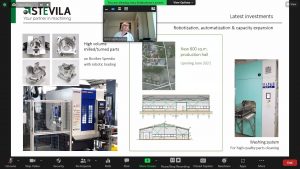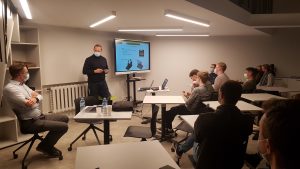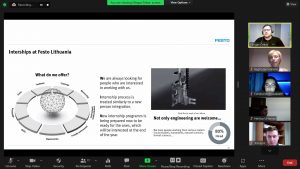The study module Production Development Strategy is implemented in practice from the beginning of the second cycle study program Production Engineering. The module is regularly updated considering the latest industry trends, the country’s strategic goals, and the experience of manufacturing companies.
Social partners were involved in the study module to motivate students and stimulate their interest in production planning, production volumes, market needs, company quality planning, and management.
During the first months of studies, the representatives of the three companies shared the best experience and challenges of the companies they represent in solving the issues of development, automation, digitalization, and product quality assurance. During the first months of studies, the representatives of the three companies shared the best experience and challenges of the companies they represent in solving the issues of development, automation, digitalization, and product quality assurance.
Irma Senkuvienė, IT Director of UAB STEVILA, was the first to share her insights. The company’s history dates back to 1997 when mass production of one type of fastener began with the stubbornness of young engineering enthusiasts. At that time, three employees of the company were working on four machines of the old model.
Today, it is an advanced company with 145 employees and 60 CNC machines, of which 30 are turning / turning-milling and 30 are milling. In September, the company opened its first robotic/automated workshop. The company cooperates with some of the most famous brands: Continental, Siemens, ABB, MAG, and others. The Stevila Group includes subsidiaries Itmecha (LT), CNC Servisas (LT), Linatec (DE), Baltic Automotive Technologies (PL), Irkatek (UA). Senkuvienė presented the company’s development path, paying more attention to the presentation of production preparation and execution and work with several ERP system modules, drawing the audience’s attention to the advantages of production digitalization.
Elingas Čekas, the head of the technical documentation department of UAB FESTO, started the lecture with his success story. Eling is a graduate of this study program. After graduating, he continued his research activities in doctoral studies. The proposal to start work did not prevent the successful completion of PhD studies. Today, he already shares his experience in the automation of industry and processes, from individual components to final solutions. The company provides solutions for industry, offers training for employees, vocational schools, colleges in pneumatics, hydraulics, mechatronics, sensors, programmable logic controllers, electric drives, and other areas.
This two-month cycle was completed by Aurelijus Belickas, Director of ELINTA ROBOTICS, together with Tommy Madsen, FANUC Sales Manager for Denmark and the Baltics. Elinta is the first Fanuc robot representative in the Baltic States. Step by step, from the first industrial revolution to today’s situation in the industry, with concrete examples, Aurelius transformed the lecture into a never-ending discussion. A guest from Denmark, Tommy, introduced the students to Fanuc’s activities and scale of growth, assuring everyone that we face the results of robot work daily, even if we do not notice it. Founded in Japan and with worldwide branches, Fanuc produces over 5,000 units per year. Industrial robots and the company have an annual turnover of about 6 billion USD. The specific examples and challenges of process automation in various companies, presented by Aurelia, aroused students’ interest and allowed everyone who had ideas for specific solutions to express themselves. Such case studies, analyzing actual situations, bring the study process closer to the realization of issues that constantly arise in production. Aurelijus concluded the lecture with a slogan: “The future is FASTER than we think!!!”.


